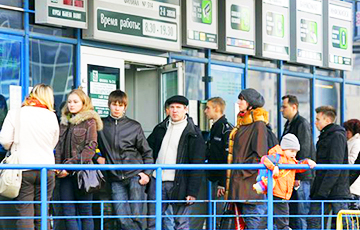Future Wages of the Belarusians Are Extremely Doubtful, Barys Zhaliba Says
29- 18.12.2018, 8:48
- 40,619

Why do people agree to work two hours a day?
The number of troubled enterprises with salary payments has increased significantly in Belarus. According to the data of the Ministry of Labor inspectorates, in October more than 230 enterprises held back wages or paid less than a "minimum wage".
At the same time, even the authorities themselves have to admit that more and more Belarusians are looking for a job abroad. Unofficial figures prove a million citizens abroad, Labor Minister Iryna Kastevich "found" half a million people who are not employed in the economy.
How can the macroeconomic situation in the country be assessed in the light of these facts? What will happen to wages in the future? Barys Zhaliba, Doctor of Economic Sciences, answers question of the Charter97.org:
- The future of wages is extremely vague, as well as of the entire economy. Indeed, too many companies cannot pay wages on time. This highlights problems with revenue and product sales. This means the problem with the quality of products and modern technologies, or rather their absence.
Even the official statistics states that the "growth" of nominal wages is almost three times higher than the growth of labor productivity. That is, there are risks in spite of low wages in Belarus: macroeconomic imbalance is being created, which we already had in late 2010 and led to a very deep financial and currency crisis in 2011. The exchange rate of the Belarusian ruble, as we remember, then collapsed sharply - almost by three times.
The Belarusian economy's capacity to raise wages has been nearly exhausted. According to some data, half of Hrodna builders are now working in Poland. This speaks volumes for the situation in the country.
The next year will be troublesome for the Belarusians.
- Is it true? After all, many are already forced to work part-time. Recently, Minskdrev was transferred to a 2-hour working day - and this is after "modernization.
- It's not the first time when people start working 2 hours a day. This is a frequently used trick of administrations at enterprises. It's not wise to dismiss employees because it can attract attention of regulatory bodies. They turn to this trick to keep the statistics clean.
Worst of all, people agree to work two hours a day. After all, they simply cannot find another job and hope that it is temporary. But the practice shows that the situation is becoming permanent. As a result, workers find themselves in a social impasse: they work almost for free, but cannot quit because of lack of jobs, especially in the regions.
- We keep saying "loss-making public enterprises, loss-making public sector"... The other day the case of Valkavysk became known: workers at the enterprises sold to a Turkish investor work in sub-zero temperatures and have not been paid for two months already. How would you comment on such "privatization"?
- It should be noted that the change of ownership does not guarantee an effective operation of an enterprise. This is especially true for Belarus: the legacy a new owner gets in the form of debts and loans is so heavy that it does not allow him to make it to profitable work.
Therefore, there is a high chance that state-owned enterprises will fall into hands of dishonest owners as a result of such "privatization". The state, realizing uselessness of such enterprises and without wishing to deal with their debts, can sell them to "investors", without particularly understanding what kind of owner he is, what kind of reputation and work experience he has. Just to shake it off, that's all.
This is especially true for small enterprises in the regions.
- In 1994 Lukashenka said "I'll launch plants". What can be said about the state of Belarusian enterprises today?
- The year 2010 and the crisis that followed was the moment of truth for the Belarusian economy. It was the time which proved that many things in the country were based on outdated Soviet heritage.
Enterprises used the backlog, especially in technology, which was made in the Soviet era. The year 2010 became a "cold shower" for the country's leadership: suddenly it turned out that times had changed, and the Soviet legacy had long been wasted.
It turned out that Lukashenka's system had faltered. The whole "modernization" made by the authorities turned out to be ineffective. Because the main thing was failed - modernization of work relations. They've been outdated for 25 years. It has become a major mistake, which is now increasingly reveals itself.








